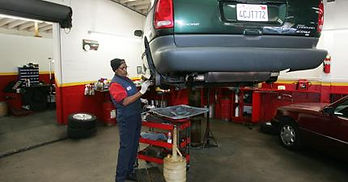
Factory Scheduled Maintenance: 30K , 60K , 90K , 120K , 150K , 180K 200K
At The Driveway Doctors, we understand how important your car is to you and we know what preventive maintenance your car needs. Our mobile mechanics can help you follow your car’s maintenance schedule. We are a one-stop shop for your car's factory recommended maintenance and all of your auto-repair needs.

All vehicles have scheduled maintenance services required by car manufacturers to maintain the factory warranty.
List of Scheduled Maintenance Services:
1. Air Filtration Replacement Service
A clean air filter helps the car perform better. To improve gas mileage, engine performance and acceleration, the air filter is replaced. To help keep contaminants out of the engine oil, replace the filter element. To reduce fumes, air pollution and wear on engine parts, replace the PCV Valve.
2. Automatic Transmission Fluid Service
This service is designed to remove old, degraded transmission fluid with fresh fluid. To prolong the life of the transmission, this service removes the dirt, grit and abrasives that damage the transmission. Filter and pan gasket replacement - based on vehicle make and transmission type, are also suggested.
3. Battery Maintenance Service
A technician inspects the battery connections, the hardware, condition of the battery case, the electrolyte level and the battery performance load. The technician inspects the alternator belts, brackets and connections and tests the voltage and current. The starter is inspected for proper connections and mounting. The starter is tested to see how much electrical power is required to turn-over the engine when the engine is cranked. Based on the diagnosis, the shop recommends the service that's right and will replace only the needed components. A battery aged three or more years is a good candidate for replacement.
4. Brake System Fluid Service
Brake fluids absorb moisture over time. This means that the brakes perform less well when needed the most: during hard-braking. Replacing the brake fluid is recommended at regular intervals based on the owner’s manual. The brake-fluid level should also be checked periodically, preferably with every oil change.
5. Cabin Air Filter Service
In a compact area like the vehicle’s interior, there are high concentrations of dust, pollen and bacteria, which can affect the health of the car’s driver and its passengers - aggravating allergies. Vehicles have cabin air filters to clean incoming air. Cabin air filters are electro-statically charged and work like magnets to collect pollutants as they try to enter and move through the car. The rule of thumb is - air filter replacement every 15,000 miles.
6. Cooling System Service
The overheating of the cooling system is a common cause of mechanical breakdown on the road. Overheating also causes severe damage to the car’s engine and transmission. The engine coolant (anti-freeze) protects the engine from overheating and from freezing. Its effectiveness diminishes over time and loses many of its protective properties: it even causes the radiator to rust and corrode. The cooling system gets clogged with built-up deposits from oil, grease, scale, hose decomposition and other materials. Visit a repair shop if you have any of these symptoms: the vehicle overheats; the coolant or temperature light comes on; the temperature gauge is higher/lower than normal, and, if the car’s heater does not work.
7. Fuel Filter Replacement Service
The fuel filter helps prevent water, dirt particles and other contaminants from getting into the vehicle's fuel system where they clog up the fuel injection system or carburetor. The fuel filter also gets clogged or contaminated over time, making the car perform at less than its best. The filter is replaced according to the owner’s manual; or, every year or two - if under severe driving conditions like constant stop-and-go driving.
8. Fuel System Cleaning Service
To restore maximum power and performance of the engine, a fuel-system cleaning is needed. Fuel injection maintenance is recommended under the owner’s manual to keep the car performing at its best. A system cleaning helps to alleviate the following symptoms: trouble starting; poor gas mileage and performance ; hesitating or knocking and, rough idle.
9. Full Service Oil, Lube & Filter Change
Changing the engine oil and filter on a regular basis is the single most important maintenance service for a vehicle. If you’re often in stop-and-go traffic, city driving, or go on frequent-short trips, you may want to change your oil more often.
10. Light Bulb Replacement Service
Working lights and light bulbs are critical to driving safety on the road. The headlights need to work properly for oncoming traffic to see you, and for you to see them. Your taillights need to work - so drivers following you will know, when you are stopping or turning. Visit a shop if any of the following bulbs are burned out: headlights, taillights, parking lights, reverse lights, or fog lights.
11. Serpentine Belt Replacement Service
Serpentine belts are critical to the operation of these vehicle components: from the water pump, to the power steering pump, to the alternator, to the air conditioning. It is important to have the serpentine belt inspected regularly. A worn serpentine belt is not always obvious, so it is important to have it changed according to your vehicle manufacturer's specifications. Timely replacement could mean the difference between trouble-free operation and big trouble.
12. Tire Rotation Service
Tire rotation helps keep you safe on the road and extend the life of the tires of the vehicle. Tire rotation helps ensure that all of tires wear evenly. Most manufacturers recommend rotation of tires frequently, generally every 6,000 to 12,000 miles or when tire tread wear appears uneven. While performing the service, a technician also checks the tire pressure and inspects the tires for any damage or unusual wear.
13. Wiper Blade Replacement Service
Worn blades are easy to overlook but they can pose a serious safety hazard while driving. A rule of thumb is to change the wiper blades every six months or so, especially in an areas with extreme temperature changes. The vehicle's old blades are removed and new quality blades are installed. The windshield wiper arm assembly is also checked for any damage.




